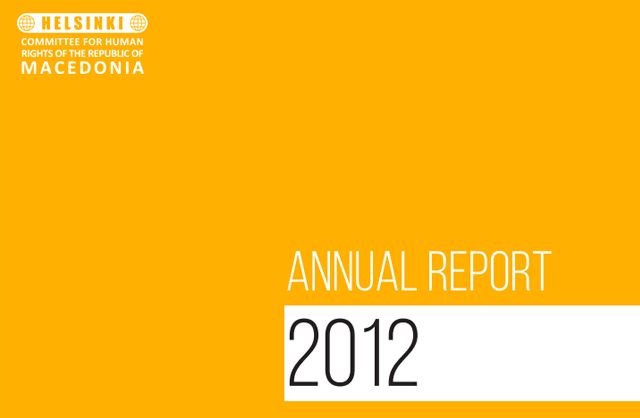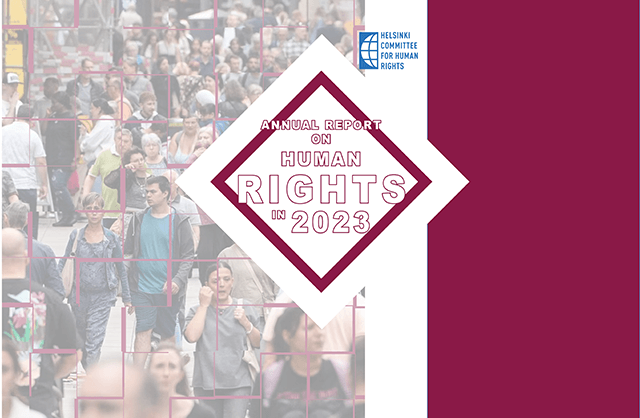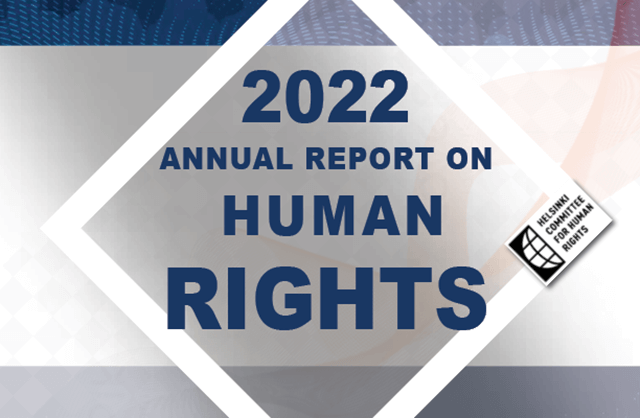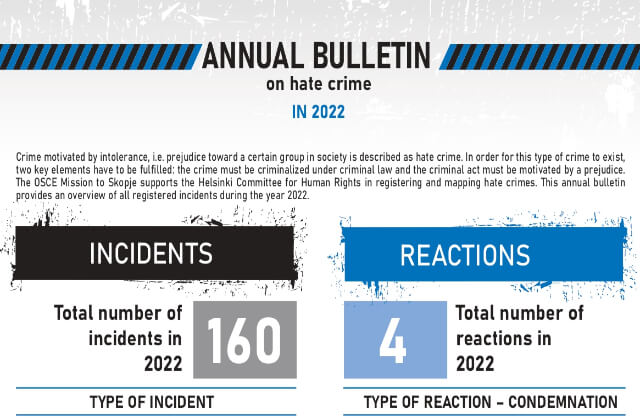Annual report on human rights in 2012
June 26, 2013

In 2012, serious violations of the freedoms and rights of citizens were found, as well as severe violations of the principle of rule of law and legal state. What is particularly worrying is that the registered violations of human rights and freedoms in the reporting year indicate systemic problems in the functioning of authorities and institutions and the abuse of their competencies. The annual report is a summary of the analyses of the identified human rights situations in the following areas: judiciary, legislature, police conduct, lustration, discrimination, freedom of media and freedom of expression, penitentiaries, economic and social rights, civil and political rights and LGBT community.
The Helsinki Committee concludes that on 24.12.2012 in the Parliament of the Republic of Macedonia, a direct attack to the constitutional order was made. The Committee prepared a special report on the developments in and before the parliament building on this day and found serious violations of the basic principles of the state of law and the rule of law. The events represent an unprecedented frightening precedent contrary to the basic principles of the rule of law.
Regarding the judiciary, the Helsinki Committee found that the right to a trial within a reasonable time was violated by the administrative authorities and the Administrative Court. While monitoring the work of the courts in the Republic of Macedonia, the Helsinki Committee for Human Rights established that the judiciary is under the constant influence of the executive branch of government, as a result of which the courts can neither manage to provide protection of the rights of citizens, nor can they provide fair trials in some of the procedures. Lack of transparency of the courts in the cases of already protected witnesses was also noted as a problem. Also, the courts do not pay due attention to the cases of domestic violence.
In the area of legislation, this report addresses the problematic points in the Law on a Special Register for Persons Convicted of Paedophilia, Law on Interception of Communications, Law on Police, Implementation of the Law on Witness Protection.
During 2012, the Committee reаcted to the case of double murder in Gostivar committed by an off-duty police officer, as well as regarding the manner in which the police investigation into the five-count murder at Smilkovo Lake was conducted.
In 2012, the lustration process continued to be implemented outside the framework defined with the decisions of the Constitutional Court, but also contrary to the opinion of the Venice Commission, which explicitly identified all those inconsistencies in the law that had been previously identified by the Helsinki Committee. These inconsistencies were the basis for the Helsinki Committee’s Initiative for Examination of the Constitutionality of the Law on Additional Requirements for Exercising Public Function, which was submitted to the Constitutional Court in September 2012.
Throughout 2012, the Helsinki Committee for Human Rights monitored discrimination in the Republic of Macedonia. Even though two years have passed since the beginning of the implementation of the Law on Prevention of and Protection against Discrimination, effective protection is still lacking, especially for marginalised groups. The Law on Prevention and Protection against Discrimination remained unchanged despite criticism from the expert community and the non-governmental sector, particularly for allowing state administration employees to be members of the Commission for Protection against Discrimination and disregarding sexual orientation and gender identity as grounds for protection against discrimination. The intensity of the Commission’s work and its visibility in public was not increased in 2012, which left the citizens uninformed about the possibilities for protection in case of discrimination and the Commission’s competencies for their protection. The fact that in 2012 there was still no court case to determine discrimination, shows the awareness of citizens about the mechanisms of protection against discrimination.
During 2012, the Helsinki Committee expressed its concern about the situation in the area of freedom of expression and freedom of the media, which are constitutionally guaranteed rights in the Republic of Macedonia. In that regard, the media outlets, the journalists, and the right to freedom of expression and freedom of the media were under constant monitoring and interest of international organisations. Namely, when it comes to this right, the eminent “Freedom House” notes a drastic decline of the Republic of Macedonia by 20 places compared to last year. The Helsinki Committee continuously monitored the media, social networks, and statements of senior public officials and representatives of political parties, and also noted that during 2012, hate speech increased, which also results in physical violence that is becoming part of everyday life in the Republic of Macedonia.
Regarding the situation in the penitentiaries, the Committee concluded that the authorities in the prisons unnecessarily delay the process of treatment of the convicts and their sending for medical treatment, thus violating their legally guaranteed right to health protection. During the year, a large number of convicts who contacted the Helsinki Committee complained about the non-functioning of legal services in penitentiary institutions. The committee also reacted to the non-commencement of the reconstruction of the prisons despite the provided funds, due to which thousands of convicts are still placed in substandard conditions. The committee also conducted a series of visits to psychiatric institutions in the country, noting the problems in its daily functioning.
The year 2012 can be remembered as a year of struggle against social injustice and realisation and protection of economic and social rights. This conclusion stems from a series of protests through which citizens demanded the state to protect their rights including consumers (citizens’ initiative AMAN), bankruptcy workers (Repair of Railways, OHIS and Civil Association UNIT) and health workers (strike of health workers). The Helsinki Committee for Human Rights also noted violations in the exercise of the right to social financial aid and irregularities in the work of the Regulatory Commission.
In 2012, the civil and political rights in the Republic of Macedonia were primarily expressed through the exercise of the right to peaceful protest (public assembly), freedom of association, and freedom of expression by several social groups, organisations, and informal associations of citizens. During this year, the observation of peaceful protests became a particular interest and practice of the Committee. The observation practice began at the request of individuals and groups due to expressed fear, disagreement with police officers who are supposed to ensure the right to peaceful protest, threats, blackmail, restriction of rights, pressure in the form of counter-protests, and political discrimination due to membership in a political party. During the past year 2012, the Helsinki Committee witnessed several events that indicate serious interference of the state in the exercise of these rights by citizens. This report also addresses political prisoners as well as cases of political pressure on individuals due to their membership in a political party.
In 2012, LGBTI people in the Republic of Macedonia also faced legal and social prejudices, discrimination, as well as an extremely homophobic environment that affects access to legislation and legal protection. People in this community are forced to adapt to a society and environment that is very homophobic and transphobic. It is especially important for the Helsinki Committee that in 2012 opened its branch – the LGBTI Support Centre. Unfortunately, this centre was the target of two violent attacks. The competent institutions were given evidence for the attacks and the Helsinki Committee expects a quality investigation and further action.


